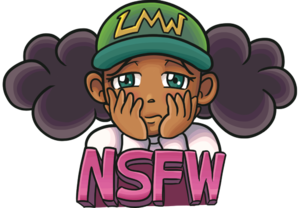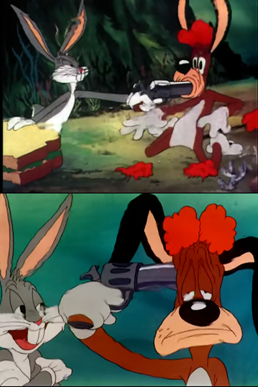Hare Ribbin' (found original ending of Warner Bros. cartoon; 1944)
A comparison picture depicting the original ending (above) and the alternate cut (below).
Status: Found
Date found: 02 Apr 1997
Found by: Jerry Beck, Phil Johnson
Hare Ribbin is a cartoon in the Merrie Melodies series released by Warner Bros. in 1944. Directed by Bob Clampett, the short stars Bugs Bunny as he faces a hound dog with a Russian accent, finding ways to torment him.
Apart from his eccentric animation style, Bob Clampett gained infamy for challenging the censors with crude and obscene jokes inserted in the shorts he directed, sometimes in a very subtle way. As a result of this practice, Hare Ribbin' gets the rare distinction of having two endings, both of which are considered too violent for the general audience.
The Director's Cut Ending
After the Russian Dog bites a giant rabbit sandwich with Bugs Bunny in it, Bugs fakes his own death, leaving the hound feeling regret and sobbing at his death, wishing that he should've been the one to die. Bugs "resurrects", saying to the Russian Dog: "Eeeeehhh... do you mean it?" Bugs Bunny then draws a revolver from his pocket, sticks it to the hound's mouth and shoots him. Bugs then places a flower at the chest of the dog's body and dances away. The cartoon ends with the dog breaking the fourth wall saying: "This shouldn't even happen to a dog!".
The ending did not pass Hays' Office censors and, as a result, this version was never shown theatrically or on television.
The Alternate Ending
A new ending was tailored in which Bugs Bunny, instead of shooting at the Russian Dog, offers him the revolver, leading him to commit suicide, a form of cartoon violence that wasn't considered taboo back in the 1940s. A new shot was drawn, made as a close-up of the two characters. The cartoon ends exactly like the original cut, afterward.
Other changes include an extended scene of when Russian dog is still searching for Bugs Bunny was shortened to the Russian dog sniffing Bugs' armpits, and an extra shot was added in this version in which Bugs shows to the audience that he curls his legs inside the loaves of bread so that the Russian Dog's bite doesn't reach him.
In 1956, the short, as part of Warner Bros.'s pre-1948 cartoon catalog, was purchased by Associated Artists Productions (a.a.p.). Much like the original ending, the alternate cut was censored when aired on television due to its suggestive themes, cutting the entire shot where the hound kills himself, as well the frames where Bugs pulls out the gun, jumping immediately to a shot of the dog laid down as if he had fainted suddenly. After the Pre-1948 Warner Bros. catalog was purchased by Turner Entertainment, the uncensored version became available to the public through home video releases, although it's still censored when aired on television, with some exceptions, like The Bob Clampett Show on Cartoon Network.
Availability
The Director's Cut remained missing for nearly fifty years, since A.A.P. did not own the short's original negatives, which were stored in Warner's archives. In the early 1990s, animation historian Jerry Beck discovered that one film collector named Phil Johnson owned a 35mm nitrate reel of the original ending. The director's cut saw its official debut in the fifth and final LaserDisc release of The Golden Age of Looney Tunes, in 1997. By the time of its release, Turner had already been purchased by TimeWarner, the parent company of Warner Bros.[1]
Both the altered and director's cuts of Hare Ribbin' were released on DVD by Warner Home Video in The Looney Tunes Golden Collection Vol. 5, in 2007. While the altered cut was restored and remastered, the director's cut did not get any restoration whatsoever, showing the tinting of the color in the film, which suggests that Warner Bros. did, in fact, lose the director's cut's master reel.
Gallery
The ending from the director’s cut.
The ending from the theatrical release.
The full scene of Russian Dog sniffing Bugs Bunny.
The shorten scene found in the theatrical release.
See Also
- Looney Tunes: By A Hare (lost build of cancelled arcade racing game; 1993)
- Looney Tunes: Laff Riot (found unreleased pitch pilot of "The Looney Tunes Show" animated sitcom; 2009)
- Looney Tunes: Space Race (lost build of cancelled original Nintendo 64 version of Dreamcast/PlayStation 2 racing game; 1998-1999)
- Looney Tunes and Merrie Melodies (partially found original title cards for animated shorts; 1930s-1940s)
- New Looney Tunes "To Catch a Fairy" (partially found unaired Toon City version of Warner Bros animated series episode; 2014)
- Looney Tunes ClickN Read Phonics (partially found Flash animated internet shorts; 2011)
- Fish Tales (found redrawn colorized version of Looney Tunes short; 1968)
- The Heckling Hare (lost original ending of Looney Tunes short; 1941)
- Porky's Hare Hunt (found redrawn colorized version of Looney Tunes short; 1968)
- The Bugs Bunny Show (partially lost animated TV series; 1960-2000)
- Noël chez Bugs Bunny & Opération Bugs Bunny (found French live-action/animated Christmas TV special; 1997)
- The New Daffy Duck Show (lost pilot script for unproduced animated series; 1997-1998)
- Looney Tunes and Merrie Melodies (partially found original title cards for animated shorts; 1930s-1940s)
- Looney Tunes (partially lost computer colorized versions of shorts; 1990-1995)
- Looney Tunes & Merrie Melodies (partially found deleted scenes of various shorts; 1930-1969)
External Link
- Wikipedia page on Hare Ribbin. Retrieved 30 Apr '19
Reference
- ↑ The CENSORED Looney Tunes and Merrie Melodies Guide. Retrieved 30 Apr '19

